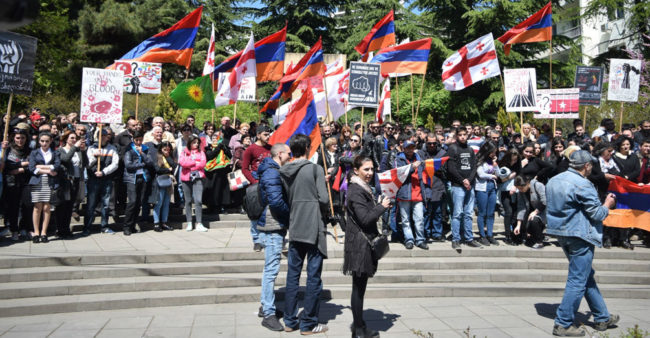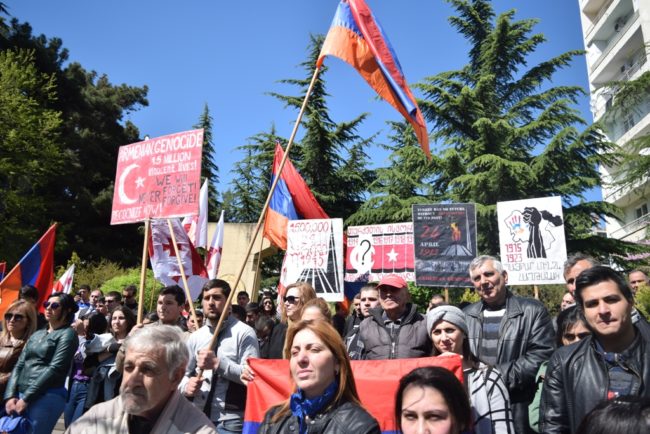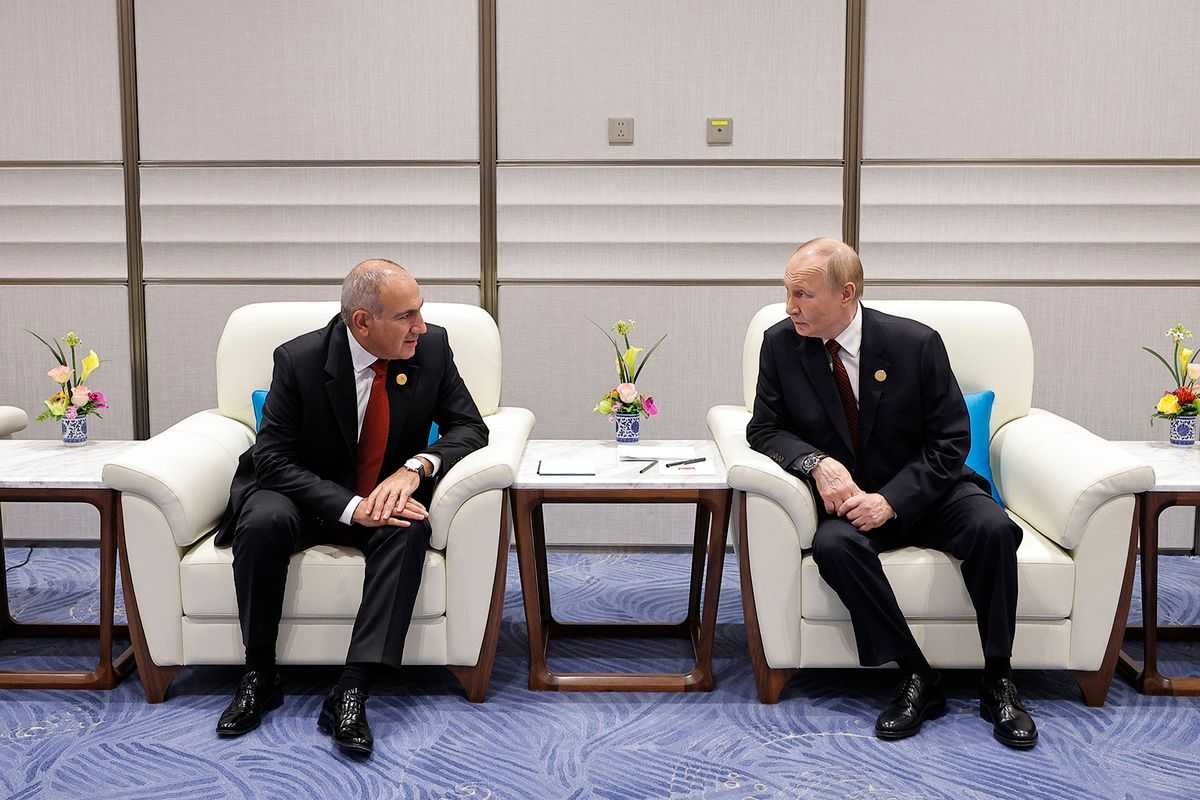

 Georgia’s Armenian community gathered in front of the Turkish embassy in Tbilisi on 24 April, to commemorate the 102nd anniversary of the Armenian genocide, and demanded its recognition by Turkey and Georgia.
Georgia’s Armenian community gathered in front of the Turkish embassy in Tbilisi on 24 April, to commemorate the 102nd anniversary of the Armenian genocide, and demanded its recognition by Turkey and Georgia.
Vahan Abrahamyan, a student at Yerevan State University currently studying in Tbilisi on an exchange programme, was one of many demonstrators gathered near the embassy on Tbilisi’s crowded Chavchavadze avenue.
‘The Armenian genocide is an event which unites all Armenians. It’s a phenomenon that all Armenians know about and learn about from childhood, and commemorate every year’, he told OC Media.
In 1915, the Ottoman government undertook the systematic extermination of 1.5 million Armenians, mostly Ottoman citizens within the empire. Its successor, Turkey, vehemently denies that Armenians were deliberately killed, and objects to the use of the term ‘genocide’.
‘Until last year there were no problems from the Georgian authorities’
Armenian advocacy group the Armenian Community of Georgia (ACG) has been organising protests in front of Turkish embassy in Tbilisi and in other parts of the country since 2005.
‘Until last year there were no problems from the Georgian authorities, but last year some people linked it to the four-day war in Karabakh, and the Georgian authorities asked the Armenian Community not to organise the protest in front of the Turkish embassy’, Arsen Kharatyan, editor-in-chief of the Georgian, Armenian-Georgian-Russian language media outlet Aliq Media, told OC Media. As a result, last year, the Armenian community gathered in Avlabari, a densely Armenian-populated district of Georgia’s capital, instead of protesting at the Turkish embassy.
In 2017, according to members of the ACG, a request sent to Tbilisi City Hall around a month earlier for permission to hold the event received a negative response. The ACG was told the event was ‘undesirable’, as it would complicate traffic.
‘We did not perceive the response as a ban, as the current constitution of Georgia grants us the right to gather and protest. So we gathered here yesterday evening and today as well, but it’s disappointing that we got this kind of response’, Sandro Ohanyan, communications manager of ACG, told OC Media.
While Tbilisi City Hall told the community it was simply a suggestion to avoid traffic issues, some community members believe that there could be more going on.

‘I can’t speculate anything. I have a feeling that it could be anything from other ethnic groups in the country who are not very happy that this event might be provoking, or there might be a very genuine need to prevent any escalation of the conflict’, Kharatyan said.
Kharatyan also believes that Georgia’s strategic partnership with Azerbaijan and Turkey could be behind the City Hall’s reaction. But he insists that Georgian Armenians, most of whom he says ended up here because of the genocide, have the right to gather and commemorate.
Some believe that the response was a result influence from the Turkish government, who maintain that the killings were comparable to other casualties during World War I.
‘We simply do not know if the officials, while signing the response letter, were under anyone’s influence. We don’t want to hurt the country’s reputation, but if you remember other recent moves from Turkey — how they tried to block the bill to mark Didgoroba, it all makes sense’, Sandro Ohanyan told OC Media. ‘This is not the official position of the ACG, it’s simply my thoughts’, he added.
The day of Didgori
An initiative to declare the historical holiday of Didgoroba (the day of Didgori) a public holiday passed its first reading in Georgia’s parliament in March.
Didgoroba celebrates the 1121 victory of the Kingdom of Georgia over the Great Seljuk Empire (a medieval Turko-Persian empire and predecessor to the Ottoman Empire) in the Battle of Didgori. The day has become a part of Georgia’s national identity, as a day when the ‘Islamic threat to Georgian identity was defeated’.
On 21 April, member of parliament and author of the draft law, Nukri Kantaria, said that the Turkish embassy had made a ‘friendly request’ not to pass the law in its current form.
‘The Turkish embassy only asked us in a friendly way, and said that Didgoroba is the day of their defeat, so passing the law might harm our relationship. It was a friendly request. Nobody can interfere with Georgia’s internal activities’, Kantaria told Netgazeti. This stirred long-present anti-Turkish sentiments, which were especially visible on nationalist Facebook pages.
The Turkish Embassy in Tbilisi declined to comment on Kantaria‘s comments, but categorically denied that the Embassy had any kind contact with Tbilisi City Hall regarding the 24 April demonstration.
The issue of recognition
The Armenian community is urging Georgia to officially recognise the genocide, and have been requesting that parliament discuss the issue.
‘We — Armenians and Georgians — are brothers’. This sentiment was widely present on the demonstration. ‘All the slogans are based on brotherhood and on the fact that Georgia contributed hugely during the genocide — they helped a lot of Armenians during the massacres. A lot of Armenians fled the Ottoman Empire to Eastern Armenia, Russia, through Georgia. Tbilisi was a major point where all these Armenian refugees would come after the genocide. Georgia does not need any additional proof [to recognise the genocide]’, Abrahamyan told OC Media.
‘All the World knows about the Armenian genocide, whether they recognise it or not. We will get our justice and all the world will know that Armenian genocide will be recognised by the whole world, including Turkey, sooner or later’, Vartan Papikyan, a member of the ACG added.
Demonstrations were also held in other parts of Georgia — in Akhaltsikhe and Ninotsminda, bordering Armenia.
Huge demonstrations took place in Armenia, where 24 April is a national holiday. According to Caucasian Knot, activities in Yerevan continued for two days. People lay flowers at the Tsitsernakaberd Memorial Complex in the capital.
In Abkhazia, de facto President Raul Khadzhimba addressed the crowd, expressing his condolences. The occasion was marked in the North Caucasus in Stavropol Krai.








